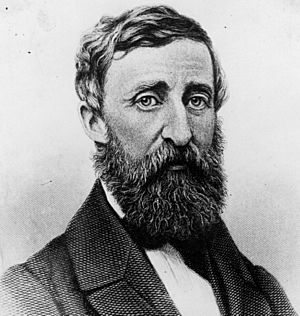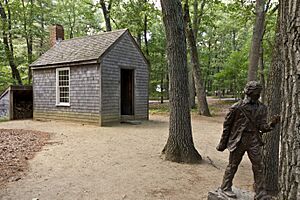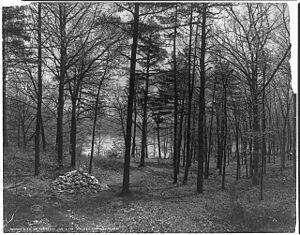Walden facts for kids
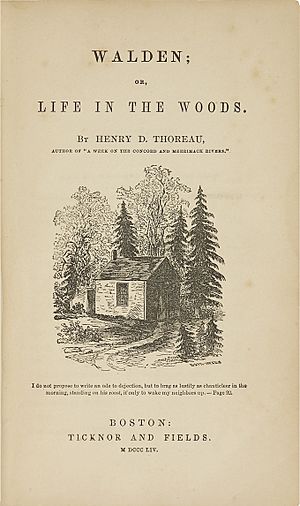
Original title page of Walden featuring a picture drawn by Thoreau's sister Sophia
|
|
| Author | Henry David Thoreau |
|---|---|
| Original title | Walden; or, Life in the Woods |
| Country | United States |
| Language | English |
| Genre | Memoir |
| Published | August 9, 1854 (Ticknor and Fields: Boston) |
| Media type | |
| Text | Walden at Wikisource |
Walden, first published in 1854, is a famous book by American writer Henry David Thoreau. The book is about Thoreau's choice to live a simple life close to nature. It's like a personal story, a social experiment, and a guide for living on your own. It also explores spiritual ideas.
Walden shares Thoreau's experiences over two years, two months, and two days. He lived in a small cabin he built near Walden Pond. This area was a woodland owned by his friend and mentor, Ralph Waldo Emerson. It was close to Concord, Massachusetts.
Thoreau carefully observed nature. He used scientific details and poetic language to describe what he saw. He named many plants and animals. He also wrote about the color and clearness of the water. He even recorded when the pond froze and thawed. Thoreau also tried to measure the depth of Walden Pond, which people thought was "bottomless."
Contents
- Why Thoreau Lived in the Woods
- Living Simply: Economy and Shelter
- Finding Your Place: Where I Lived, and What I Lived For
- Learning from Books and Nature: Reading and Sounds
- Being Alone: Solitude and Visitors
- Working the Land: The Bean-Field
- Trips to Town: The Village
- Exploring the Water: The Ponds
- Meeting Others: Baker Farm and Brute Neighbors
- Preparing for Winter: House-Warming and Winter Visitors
- Nature in Winter: Winter Animals and The Pond in Winter
- New Beginnings: Spring
- Final Thoughts: Conclusion
- Key Ideas in Walden
- Images for kids
- See also
Why Thoreau Lived in the Woods
I went to the woods because I wished to live deliberately, to front only the essential facts of life, and see if I could not learn what it had to teach, and not, when I came to die, discover that I had not lived. I did not wish to live what was not life, living is so dear; nor did I wish to practice resignation, unless it was quite necessary. I wanted to live deep and suck out all the marrow of life, to live so sturdily and Spartan-like as to put to rout all that was not life, to cut a broad swath and shave close, to drive life into a corner, and reduce it to its lowest terms, and, if it proved to be mean, why then to get the whole and genuine meanness of it, and publish its meanness to the world; or if it were sublime, to know it by experience, and be able to give a true account of it in my next excursion.
Walden is part memoir and part spiritual journey. It begins with Thoreau explaining his two years at Walden Pond. He lived a simple life without much help from others. The book is divided into chapters, each focusing on different ideas.
Living Simply: Economy and Shelter
In the first and longest chapter, "Economy," Thoreau explains his project. He stayed for two years, two months, and two days in a small, cozy cabin. It was 10 by 15 feet and built in the woods near Walden Pond. He wanted to show the good things that come from a simple lifestyle. He easily got the four basic needs: food, shelter, clothing, and fuel. His family and friends helped him, especially his mother and Ralph Waldo Emerson. Emerson let Thoreau build his house and plant a garden. In return, Thoreau cleared land and did other chores. Thoreau carefully wrote down all his costs and earnings. This showed how he managed his "economy" while building his house and growing food.
Thoreau spent US$28.12 (equivalent to $883.17 in 2022) to build his house. He shared the details because few people know exactly what their homes cost:
- Boards,............................ $8.03½, mostly shanty boards.
- Refuse shingles for roof and sides, 4.00
- Laths,............................. 1.25
- Two second-hand windows with glass, 2.43
- One thousand old brick,............ 4.00
- Two casks of lime,................. 2.40 That was high.
- Hair,.............................. 0.31 More than I needed.
- Mantle-tree iron,.................. 0.15
- Nails,............................. 3.90
- Hinges and screws,................. 0.14
- Latch,............................. 0.10
- Chalk,............................. 0.01
- Transportation,.................... 1.40 I carried a good part on my back.
- In all,..................... $28.12½
Finding Your Place: Where I Lived, and What I Lived For
Thoreau remembers places he thought about living before Walden Pond. He mentions advice from the Roman philosopher Cato: "consider buying a farm very carefully." Thoreau chose the woods, dreaming of a life free from worries and full of free time. He lived far from social connections like mail. This chapter mostly focuses on his thoughts while building and living in his new home.
Learning from Books and Nature: Reading and Sounds
Thoreau talks about the benefits of reading classic books. He wished more people in Concord read serious literature. He also loved books by world travelers. He hoped that every town would have "wise men" to teach and inspire people.
In the "Sounds" chapter, Thoreau tells readers to always be "on the alert." He encourages them to "look always at what is to be seen." Truth can be found in books, but also in nature. Paying attention can make life more interesting. Instead of looking for fun in society, Thoreau found joy in his own life. Even simple chores became amusing. He enjoyed the sounds around his cabin: church bells, carriages, cows, and birds. He believed that "All sound heard at the greatest possible distance... produces one and the same effect."
Being Alone: Solitude and Visitors
Thoreau thinks about what it means to be alone. He explains that you can feel lonely even with friends if your heart isn't open. He enjoys escaping society and its small problems. He also talks about his new companions. These include an old settler and an old woman with a great memory. Thoreau often thinks about the good things that come from nature. He feels a deep connection to it. He says the only "medicine he needs is a draught of morning air."
Even though he loved being alone, Thoreau enjoyed company. He always kept three chairs ready for visitors. He had more visitors at Walden than he did in the city. He welcomed people living or working nearby. He especially mentions Alec Thérien, a French Canadian woodsman. Thérien could not read or write and lived a very simple, natural life. Thoreau compares him to Walden Pond itself. Thoreau also noticed that women and children seemed to enjoy the pond more than men. He thought men were too busy with their lives.
Working the Land: The Bean-Field
Thoreau reflects on planting beans and how much he enjoyed this new job. He describes the beauty of his surroundings. He mentions the sights and sounds of nature, but also distant military sounds. The rest of the chapter focuses on his earnings and how he grew his crops. He spent just under fifteen dollars on this.
Trips to Town: The Village
This chapter is about Thoreau's trips to Concord. He went several times a week to hear news and meet people. On one trip, Thoreau was arrested and jailed. This happened because he refused to pay a poll tax. He did not want to support a "state that buys and sells men, women, and children."
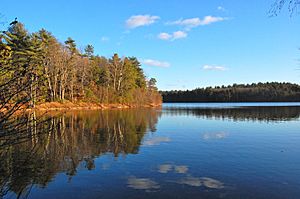
Exploring the Water: The Ponds
In autumn, Thoreau describes the countryside. He writes about Walden Pond and its nearby neighbors. These include Flint's Pond (or Sandy Pond), White Pond, and Goose Pond. Flint's Pond was the largest. But Thoreau's favorites were Walden and White ponds. He described them as more beautiful than diamonds.
Meeting Others: Baker Farm and Brute Neighbors
One afternoon, Thoreau was caught in a rainstorm. He found shelter in the small, messy hut of John Field. Field was a poor but hardworking Irish farmhand, who lived with his wife and children. Thoreau encouraged Field to live a simple, independent life in the woods. This would free him from bosses and debts. However, the Irishman did not want to give up his dreams of a more comfortable life.
The "Brute Neighbors" chapter is a simpler version of a talk Thoreau had with William Ellery Channing. Channing sometimes went fishing with Thoreau. Their conversation was about a hermit (Thoreau) and a poet (Channing). The poet was lost in thought, while the hermit was focused on catching fish. The chapter also mentions Thoreau's interactions with a mouse. It describes a fight between ants and his frequent encounters with cats.
Preparing for Winter: House-Warming and Winter Visitors
After picking berries in November, Thoreau added a chimney to his cabin. He also plastered the walls to keep out the cold winter air. He gathered a lot of firewood. He expressed his love for wood and fire.
In "Former Inhabitants; and Winter Visitors," Thoreau shares stories of people who used to live near Walden Pond. Then, he talks about the few visitors he had during winter. These included a farmer, a woodchopper, and his best friend, the poet Ellery Channing.
Nature in Winter: Winter Animals and The Pond in Winter
Thoreau enjoyed watching wildlife during the winter. He observed owls, hares, red squirrels, mice, and various birds. They hunted, sang, and ate the scraps he left for them. He also describes seeing a fox hunt pass by.
In "The Pond in Winter," Thoreau describes Walden Pond during the cold months. He says he measured its depths and found an underground exit. He also tells how 100 workers came to cut large blocks of ice from the pond. This ice was then shipped to the Carolinas.
New Beginnings: Spring
As spring arrived, Walden and the other ponds melted. This happened with loud thundering and rumbling sounds. Thoreau loved watching the thaw. He felt excited as he saw nature being reborn. He watched geese flying north and a hawk playing in the sky. As nature came back to life, Thoreau felt reborn too.
Final Thoughts: Conclusion
In the last chapter, Thoreau talks about not following the crowd. He says, "If a man does not keep pace with his companions, perhaps it is because he hears a different drummer. Let him step to the music which he hears, however measured or far away." He believed that by doing this, people could find happiness and feel fulfilled.
I do not say that John or Jonathan will realize all this; but such is the character of that morrow which mere lapse of time can never make to dawn. The light which puts out our eyes is darkness to us. Only that day dawns to which we are awake. There is more day to dawn. The sun is but a morning star.
Key Ideas in Walden
Walden highlights the importance of being alone, thinking deeply, and being close to nature. Thoreau believed this could help people escape a "desperate" way of living. The book is not just a life story. It also criticizes how modern society focuses too much on buying things. It also points out how people are disconnected from nature. Thoreau lived near society and loved classic books. This shows that his book is not just a criticism. It also tries to connect with the good parts of culture.
Some of the main ideas in Walden are:
- Self-reliance: Thoreau believed in not needing others all the time. He thought being able to support yourself, both financially and emotionally, was very important. This idea was a key part of transcendentalism, a way of thinking popular at the time.
- Simplicity: Simplicity was Thoreau's guide for life. He always tried to make his life simpler. He mended his clothes instead of buying new ones. He bought very little and relied on his own time and effort for everything.
- Progress: Thoreau questioned the idea that outward improvements always bring inner peace. He was skeptical that simply moving forward in technology or society would make people truly happy.
- The need for spiritual awakening: Thoreau believed that a spiritual awakening was essential to find life's truths. He thought these truths were often hidden by daily routines. For him, spiritual awakening was the source of all other important ideas.
- Man as part of nature
- Nature reflecting human emotions
- The government as unfair and corrupt
- Meditation: Thoreau meditated often and talked about its benefits.
- Patience: Thoreau knew that the changes he wanted to see would not happen quickly. He was willing to wait for change. He did not go into isolation just for himself. Thoreau wanted to change the world, but he understood it would take time.
Images for kids
See also
 In Spanish: Walden para niños
In Spanish: Walden para niños
 | Janet Taylor Pickett |
 | Synthia Saint James |
 | Howardena Pindell |
 | Faith Ringgold |


